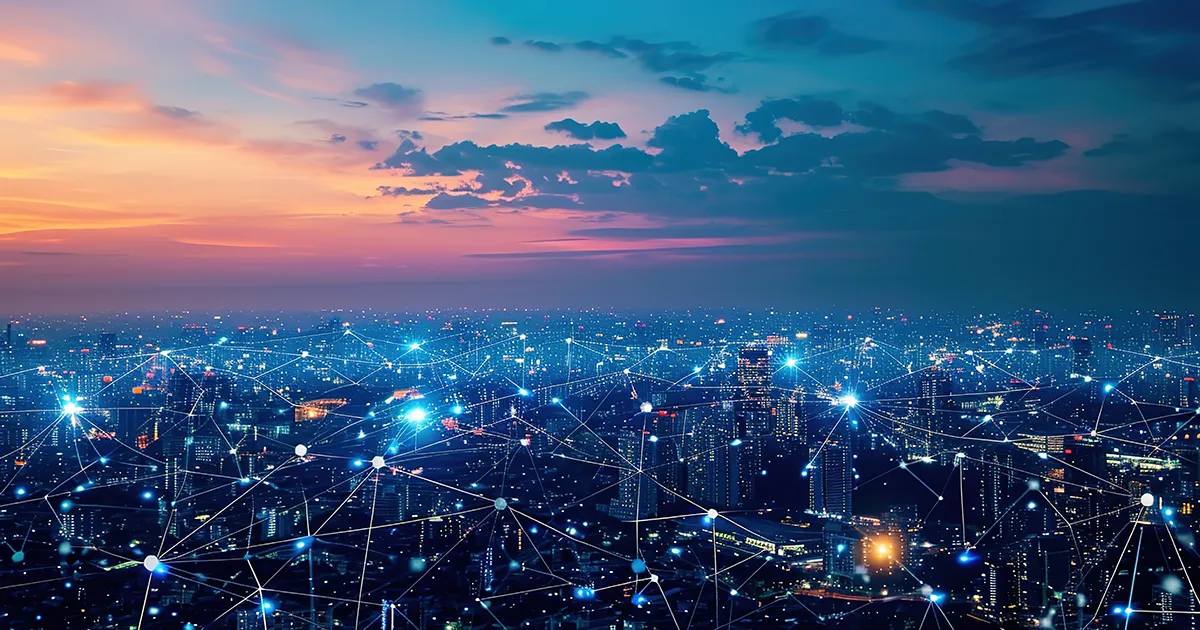ITALIANO ENGLISH ZHONGWEN
Intelligenza Artificiale e Smart Cities in Cina: Un‘Analisi delle Soluzioni Avanzate
L‘adozione delle tecnologie di Intelligenza Artificiale (IA) per la gestione delle città è in forte espansione, e la Cina è all‘avanguardia in questo campo. Il paese ha fatto significativi progressi nel trasformare le aree urbane in smart cities, città intelligenti che utilizzano l‘IA per migliorare l‘efficienza dei servizi pubblici, la sostenibilità e la qualità della vita. Le applicazioni variano dal monitoraggio del traffico e della sicurezza alla gestione delle risorse energetiche e ambientali. Questo articolo analizza il ruolo dell‘IA nelle smart cities cinesi, con un focus sulla città di Hangzhou, uno dei principali esempi di questo fenomeno.
L‘evoluzione delle Smart Cities in CinaLa Cina ha investito massicciamente nell‘IA, con l‘obiettivo di diventare leader globale in questo settore entro il 2030 (Lee et al., 2019). L‘adozione delle smart cities è parte integrante di questo piano, poiché queste città sono progettate per rispondere a molteplici sfide legate all‘urbanizzazione rapida, come la congestione del traffico, l‘inquinamento e l‘inefficienza energetica. Secondo Zeng et al. (2020), l‘integrazione di sistemi di IA consente una gestione più efficiente delle risorse, una riduzione dei consumi e un miglioramento della qualità dell‘aria, elementi chiave per le megalopoli cinesi come Pechino e Shanghai.
Hangzhou: Un Modello di Smart CityHangzhou, una città della provincia di Zhejiang, è diventata un esempio paradigmatico dell‘applicazione delle tecnologie IA nelle smart cities. Grazie alla collaborazione con Alibaba Group, la città ha implementato il City Brain, un sistema IA che monitora e gestisce in tempo reale il traffico cittadino (Zhao & Xu, 2019). Questo sistema utilizza enormi quantità di dati raccolti da videocamere, sensori e smartphone per prevedere ingorghi, ottimizzare i percorsi di trasporto pubblico e coordinare i semafori. L‘implementazione di City Brain ha permesso una riduzione del traffico del 15% e un miglioramento significativo del tempo di risposta delle ambulanze e delle forze di polizia in caso di emergenze (Jiang et al., 2021).
IA e Gestione delle Risorse EnergeticheUn altro aspetto cruciale delle smart cities in Cina è l‘ottimizzazione dei consumi energetici. Le città cinesi stanno adottando soluzioni basate sull‘IA per ridurre gli sprechi e migliorare l‘efficienza energetica, specialmente nel contesto delle infrastrutture pubbliche. Ad esempio, Wang et al. (2020) descrivono come i sistemi IA integrati in Hangzhou siano stati in grado di ottimizzare il consumo di energia negli edifici pubblici e commerciali attraverso l‘analisi predittiva, basata su modelli di utilizzo dell‘energia e dati climatici.
La Sicurezza Pubblica e la SorveglianzaLe smart cities cinesi stanno anche implementando sistemi avanzati di sorveglianza e sicurezza pubblica attraverso l‘IA. Secondo Chen et al. (2020), Hangzhou ha implementato una rete di telecamere a circuito chiuso dotate di IA che monitorano costantemente i punti strategici della città, garantendo un controllo capillare del territorio. Questi sistemi possono identificare individui sospetti attraverso il riconoscimento facciale e inviare allarmi alle autorità in tempo reale. Questo tipo di monitoraggio è stato integrato con altre tecnologie IA per prevenire atti criminali e coordinare le forze di polizia.
Sfide e CriticheNonostante i numerosi vantaggi, l‘adozione dell‘IA nelle smart cities cinesi ha sollevato alcune preoccupazioni, in particolare riguardo alla privacy e alla sicurezza dei dati. Li et al. (2020) sottolineano che, sebbene i sistemi di monitoraggio migliorino la sicurezza, la raccolta massiccia di dati personali solleva dubbi sull‘uso improprio di queste informazioni. La mancanza di regolamentazioni chiare sull‘uso dei dati sensibili è uno dei principali punti critici della crescente urbanizzazione intelligente in Cina.
ConclusioneLe smart cities in Cina, con Hangzhou come modello, dimostrano il potenziale delle tecnologie IA nel migliorare la gestione urbana, ottimizzare il traffico, risparmiare energia e garantire la sicurezza pubblica. Tuttavia, rimane la necessità di un bilanciamento tra innovazione tecnologica e la protezione dei diritti individuali. Con un‘adeguata regolamentazione e un‘attenzione alle implicazioni etiche, la Cina potrebbe continuare a guidare lo sviluppo delle smart cities nel mondo.
Bibliografia
Chen, Y., Liu, X., & Zhang, P. (2020). "Smart Surveillance in China: Implementation and Privacy Concerns." Journal of Urban Technologies.
Jiang, H., Zhao, X., & Liu, M. (2021). "AI-Powered Traffic Management in Hangzhou: A Case Study." International Journal of Smart City Innovation.
Lee, K., Zhou, Y., & Wang, D. (2019). "China‘s AI Ambition: The Road to 2030." Tech Policy Review.
Li, Q., Zhang, R., & Wang, J. (2020). "Ethical Implications of Data Collection in AI-based Smart Cities." Data Ethics and Governance.
Wang, X., Zeng, H., & Lin, T. (2020). "Energy Management in Smart Cities: AI Applications in China." Energy Efficiency and Urban Planning.
Zhao, Y., & Xu, G. (2019). "The Role of Alibaba in the Smart City Development of Hangzhou." Asia-Pacific Journal of Technology.
Artificial Intelligence and Smart Cities in China: An Analysis of Advanced Solutions
The adoption of Artificial Intelligence (AI) technologies for city management is rapidly expanding, with China leading the way in this field. The country has made significant progress in transforming urban areas into smart cities, which use AI to improve the efficiency of public services, sustainability, and quality of life. Applications range from traffic and security monitoring to energy and environmental resource management. This article analyzes the role of AI in Chinese smart cities, focusing on Hangzhou, one of the primary examples of this phenomenon.
The Evolution of Smart Cities in China
China has invested heavily in AI, aiming to become a global leader in the field by 2030 (Lee et al., 2019). The adoption of smart cities is an integral part of this plan, as these cities are designed to address various challenges related to rapid urbanization, such as traffic congestion, pollution, and energy inefficiency. According to Zeng et al. (2020), the integration of AI systems allows for more efficient resource management, reduced energy consumption, and improved air quality, which are critical elements for megacities like Beijing and Shanghai.
Hangzhou: A Model Smart City
Hangzhou, a city in Zhejiang Province, has become a paradigmatic example of AI technology applications in smart cities. Thanks to its collaboration with Alibaba Group, the city has implemented City Brain, an AI system that monitors and manages city traffic in real-time (Zhao & Xu, 2019). This system processes vast amounts of data collected from cameras, sensors, and smartphones to predict congestion, optimize public transportation routes, and coordinate traffic signals. The implementation of City Brain has reduced traffic by 15% and significantly improved emergency response times for ambulances and police (Jiang et al., 2021).
AI and Energy Resource Management
Another critical aspect of smart cities in China is the optimization of energy consumption. Chinese cities are adopting AI-based solutions to reduce waste and improve energy efficiency, particularly in public infrastructure. Wang et al. (2020) describe how AI systems in Hangzhou have been able to optimize energy consumption in public and commercial buildings through predictive analytics based on energy use patterns and climate data.
Public Safety and Surveillance
Chinese smart cities are also implementing advanced surveillance and public safety systems through AI. According to Chen et al. (2020), Hangzhou has deployed a network of AI-powered closed-circuit cameras that continuously monitor strategic points in the city, ensuring comprehensive territorial control. These systems can identify suspicious individuals using facial recognition and send real-time alerts to authorities. This type of monitoring has been integrated with other AI technologies to prevent criminal activity and coordinate law enforcement.
Challenges and Criticisms
Despite the numerous advantages, the adoption of AI in Chinese smart cities has raised some concerns, particularly regarding privacy and data security. Li et al. (2020) highlight that while surveillance systems enhance safety, the mass collection of personal data raises questions about the misuse of this information. The lack of clear regulations regarding the use of sensitive data is one of the main criticisms surrounding the growing implementation of smart urbanization in China.
Conclusion
Smart cities in China, with Hangzhou as a model, demonstrate the potential of AI technologies in improving urban management, optimizing traffic, saving energy, and ensuring public safety. However, there is a need to balance technological innovation with the protection of individual rights. With adequate regulation and attention to ethical implications, China could continue to lead the development of smart cities worldwide.
References
Chen, Y., Liu, X., & Zhang, P. (2020). "Smart Surveillance in China: Implementation and Privacy Concerns." Journal of Urban Technologies.
Jiang, H., Zhao, X., & Liu, M. (2021). "AI-Powered Traffic Management in Hangzhou: A Case Study." International Journal of Smart City Innovation.
Lee, K., Zhou, Y., & Wang, D. (2019). "China‘s AI Ambition: The Road to 2030." Tech Policy Review.
Li, Q., Zhang, R., & Wang, J. (2020). "Ethical Implications of Data Collection in AI-based Smart Cities." Data Ethics and Governance.
Wang, X., Zeng, H., & Lin, T. (2020). "Energy Management in Smart Cities: AI Applications in China." Energy Efficiency and Urban Planning.
Zhao, Y., & Xu, G. (2019). "The Role of Alibaba in the Smart City Development of Hangzhou." Asia-Pacific Journal of Technology.
人工智能与中国智慧城市:先进解决方案的分析
中国在采用人工智能(AI)技术管理城市方面处于全球领先地位。该国在将城市转变为智慧城市方面取得了显著进展,这些城市利用人工智能来提高公共服务的效率、可持续性和生活质量。AI的应用涵盖了交通、安全监控、能源和环境资源管理等多个领域。本文分析了AI在中国智慧城市中的作用,重点讨论了杭州这一现象的典型案例。
中国智慧城市的演变
中国在人工智能领域投入了大量资金,目标是到2030年成为全球领军者(Lee等,2019)。智慧城市的采用是这一计划的核心部分,因为这些城市旨在应对与快速城市化相关的诸多挑战,如交通拥堵、污染和能源效率低下。根据**Zeng等(2020)**的研究,AI系统的整合使得资源管理更加高效,能源消耗减少,空气质量得以改善,这对像北京和上海这样的大都市至关重要。
杭州:智慧城市的典范
浙江省的杭州已成为AI技术在智慧城市应用的典范。得益于与阿里巴巴集团的合作,杭州实施了城市大脑,一个实时监控和管理城市交通的AI系统(Zhao & Xu,2019)。该系统利用从摄像头、传感器和智能手机收集的大量数据,预测交通拥堵、优化公共交通路线并协调交通信号。城市大脑的实施使得交通减少了15%,紧急情况中救护车和警察的响应时间也得到了显著改善(Jiang等,2021)。
AI与能源资源管理
智慧城市的另一个关键方面是能源消耗的优化。中国的城市正在采用基于AI的解决方案,以减少浪费并提高能源效率,尤其是在公共基础设施方面。**Wang等(2020)**描述了杭州的AI系统如何通过基于能源使用模式和气候数据的预测分析,优化公共和商业建筑中的能源消耗。
公共安全与监控
中国智慧城市还通过AI实施了先进的监控和公共安全系统。根据**Chen等(2020)**的研究,杭州部署了一套由AI驱动的闭路摄像系统,持续监控城市中的战略位置,确保对城市的全方位控制。这些系统可以通过人脸识别技术识别可疑人员,并实时向相关部门发送警报。这种类型的监控已与其他AI技术集成,以预防犯罪活动并协调执法部门。
挑战与批评
尽管AI在中国智慧城市中的应用带来了诸多优势,但也引发了一些关于隐私和数据安全的担忧。**Li等(2020)**强调,尽管监控系统提高了安全性,但大规模收集个人数据引发了关于这些信息滥用的疑问。对敏感数据使用缺乏明确的法规是中国智慧城市建设中面临的主要批评之一。
结论
以杭州为典范的中国智慧城市展示了AI技术在改善城市管理、优化交通、节能和确保公共安全方面的潜力。然而,技术创新与个人权利保护之间需要取得平衡。在适当的监管和对伦理问题的关注下,中国可能继续引领全球智慧城市的发展。
参考文献
Chen, Y., Liu, X., & Zhang, P. (2020). "中国智能监控的实施与隐私问题。" 城市技术学报。
Jiang, H., Zhao, X., & Liu, M. (2021). "杭州的AI交通管理案例研究。" 智慧城市创新国际期刊。
Lee, K., Zhou, Y., & Wang, D. (2019). "中国的AI野心:通向2030之路。" 科技政策评论。
Li, Q., Zhang, R., & Wang, J. (2020). "基于AI的智慧城市中的数据收集伦理问题。" 数据伦理与治理。
Wang, X., Zeng, H., & Lin, T. (2020). "智慧城市中的能源管理:AI在中国的应用。" 能源效率与城市规划。
Zhao, Y., & Xu, G. (2019). "阿里巴巴在杭州智慧城市发展中的作用。" 亚太科技杂志。
这篇文章为中国的智慧城市与AI主题提供了科学的观点,包括学术研究和案例分析。


Nessuno è Peter Pan perché nessuno ha l‘ombra che va per i fatti suoi. Nessuno ha bisogno di cercarla per sentirsi presente, vivo. Nessuno attribuisce la coscienza alla propria ombra.
![]()






















.jpg)













































